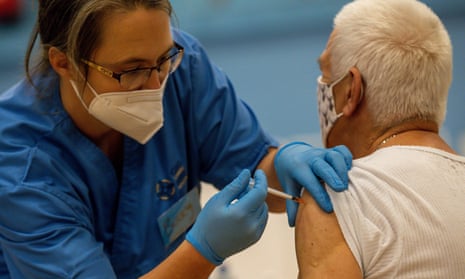Millions of people could have their booster jab brought forward as ministers consider cutting the six-month gap between doses as part of a scramble to shore up the faltering vaccine programme and avoid imposing Covid restrictions.
As the number of new daily Covid cases hit 52,009 across the UK, the government is launching an advertising campaign urging people to get their booster and flu jabs.
The publicity blitz, under the slogan “get vaccinated, get boosted, get protected”, will run on TV and billboards amid mounting concern about the effectiveness of the jab rollout.
Boris Johnson declined to rule out reducing the wait for a third dose after the former health secretary Jeremy Hunt suggested moving to a five-month gap would increase the proportion of the public who are fully protected.
Downing Street sources later confirmed the government was examining the option, though it would need to be recommended by the independent Joint Committee on Vaccination and Immunisation (JCVI).
Hunt told the House of Commons: “This decision that’s been made, that you can’t have your booster jab until six months after you had your second jab – how hard and fast should that rule be? Does it really matter, when it’s only nine weeks till the Christmas holidays, if someone has a booster jab after five months?”
He was among a string of Conservative MPs who peppered the new vaccines minister, Maggie Throup, with questions in the Commons, amid concerns that the vaccination drive has been allowed to drift. Throup’s predecessor was the more high profile Nadhim Zahawi, promoted to education secretary in September’s reshuffle.
Mark Harper, the chair of the Tory Covid Recovery Group, said that in the earlier stages of the vaccine rollout “there was a massive focus on it in government, from the prime minister downwards … we need that level of focus on boosters”.
Bernard Jenkin, the chair of the influential Commons liaison committee, said Johnson should take a more prominent role. “It is dead easy to get the public engaged on this subject: the prime minister holds a press conference with the chief medical officer and the chief scientific adviser and starts to explain in harsh terms what will happen if people do not carry on being vaccinated. That is the way to communicate, and we should do that,” he said.
A senior government health adviser said they believed the focus on an expedited booster campaign was a red herring, however, and that a change to five months would not make much of a difference as it was just a small part of a much bigger picture.
Some 2.68 million people aged 80 and over in England have received two doses of vaccine, of whom 1.34 million (50%) are now estimated to have had their booster dose.
Labour has called on the government to speed up the programme. In the Commons, the shadow health secretary, Jonathan Ashworth, said the NHS was coming under pressure because “the vaccination programme is now stalling” and called on the government to commit to 500,000 jabs a day. There were 75,445 administered on Wednesday.
“Ministers cannot blame the public when 2 million haven’t even been invited for a booster jab and on current trends we won’t complete the booster programme until March 2022,” he said.
NHS and doctors’ leaders and scientists have urged the government to trigger its “plan B” measures, which include reintroducing mandatory mask-wearing in public places and restoring working from home guidance.
Senior government sources confirmed there was still a firm view that Covid passports – controversial with Tory MPs – would also form part of any move to plan B, with one saying that businesses had had “plenty of time to prepare for that possibility”.
However, ministers still hope to avoid the need for fresh restrictions. They believe next week’s half-term holiday in schools in England could act as a firebreak, given the high prevalence of the disease among unvaccinated children.
There are also hopes in government that the public may moderate their behaviour and take more precautions after widespread media coverage of the surge in cases over recent days.
Javid was pictured wearing a mask at the funeral of the Conservative minister James Brokenshire on Thursday, after conceding that public figures should set an example. The leader of the House of Commons, Jacob Rees-Mogg, took a different stance, however, saying the reason he and some of his colleagues were not wearing masks was that they had “a more convivial, fraternal spirit”.
Speaking in Northern Ireland on Thursday, the prime minister underscored the fact that the government’s current approach is to press ahead with its plan A. He insisted the number of new Covid cases was still within expectations. “The numbers of infections are high but we are within the parameters of what the predictions were, what Spi-M [the advisory modelling group] and the others said we would be at this stage given the steps we are taking. We are sticking with our plan,” he said.
